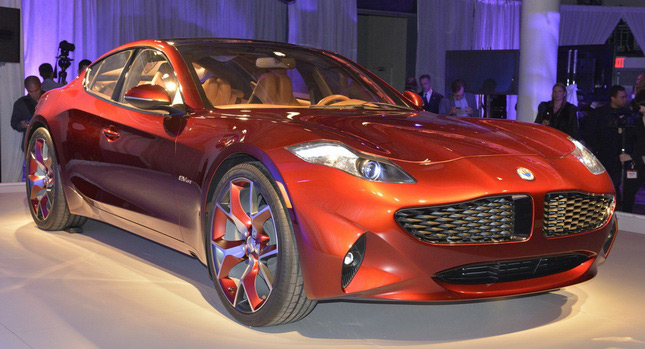Building a car company from scratch is quite an achievement. Deciding that your first product will be a US$100,000+ hybrid saloon is very bold. Launching it to the market means, you’ve arrived, even if it’s a little later than originally planned and your first-ever model faced some recall issues soon after its sales began.
Henrik Fisker did all of the above in four years. He knew very well though that you can’t sustain a company with a single model; especially one that costs more than US$100K. That’s why Fisker Automotive revealed the Atlantic, a mid-size petrol-electric hybrid, at the New York Show last April.
The new model, which keeps the Karma’s futuristic look, is scheduled to be Fisker’s first mass-produced car and will be rivaling the likes of the Audi A5 Sportback. It is a plug-in hybrid combining a BMW-sourced 2.0-liter turbocharged four-cylinder gasoline unit with an electric motor and a lithium-ion battery pack.
Priced at around US$50,000 excluding government and/or state “green” incentives, the Atlantic will cost half as much as the Karma and, according to the company’s plans, will be assembled to a retooled former GM plant in Delaware.
According to a Reuters report, though, production of Fisker’s second model has been pushed back. The news agency says that, during an investor presentation on Monday, it was revealed that the mid-size saloon will enter pre-production in 2014 and will thus hit the market a couple of years later than originally anticipated.
“The Atlantic is really the volume car that begins to build growth”, said Fisker’s new CEO Tony Posawatz during a conference call with investors and analysts. “It creates a business model that is one where we can really generate cash in the future.”
Former GM executive Posawatz, who replaced Tom LaSorda in August, also revealed that the target starting price for the Atlantic is US$55,000. He added that the company may “engage in some discussions with partners to use this platform, this technology, which very few people have.”
The problem is that, despite having raised US$1.2 billion in private financing since its inception in 2007, the Department of Energy froze a big part of its US$529 million government loan, with Fisker now seeking to find an extra US$150 million to fund production of the Altantic.
Right now, the mid-size hybrid saloon project is, like the Delaware factory, on hold despite about 90 percent of the car’s parts having already being engineered. “We’re looking at the next phase of our investment and progression as a company to restart the Atlantic program in earnest”, said Posawatz who is also looking at partnerships with major automakers in order to cut supply costs.
By Andrew Tsaousis
PHOTO GALLERY








